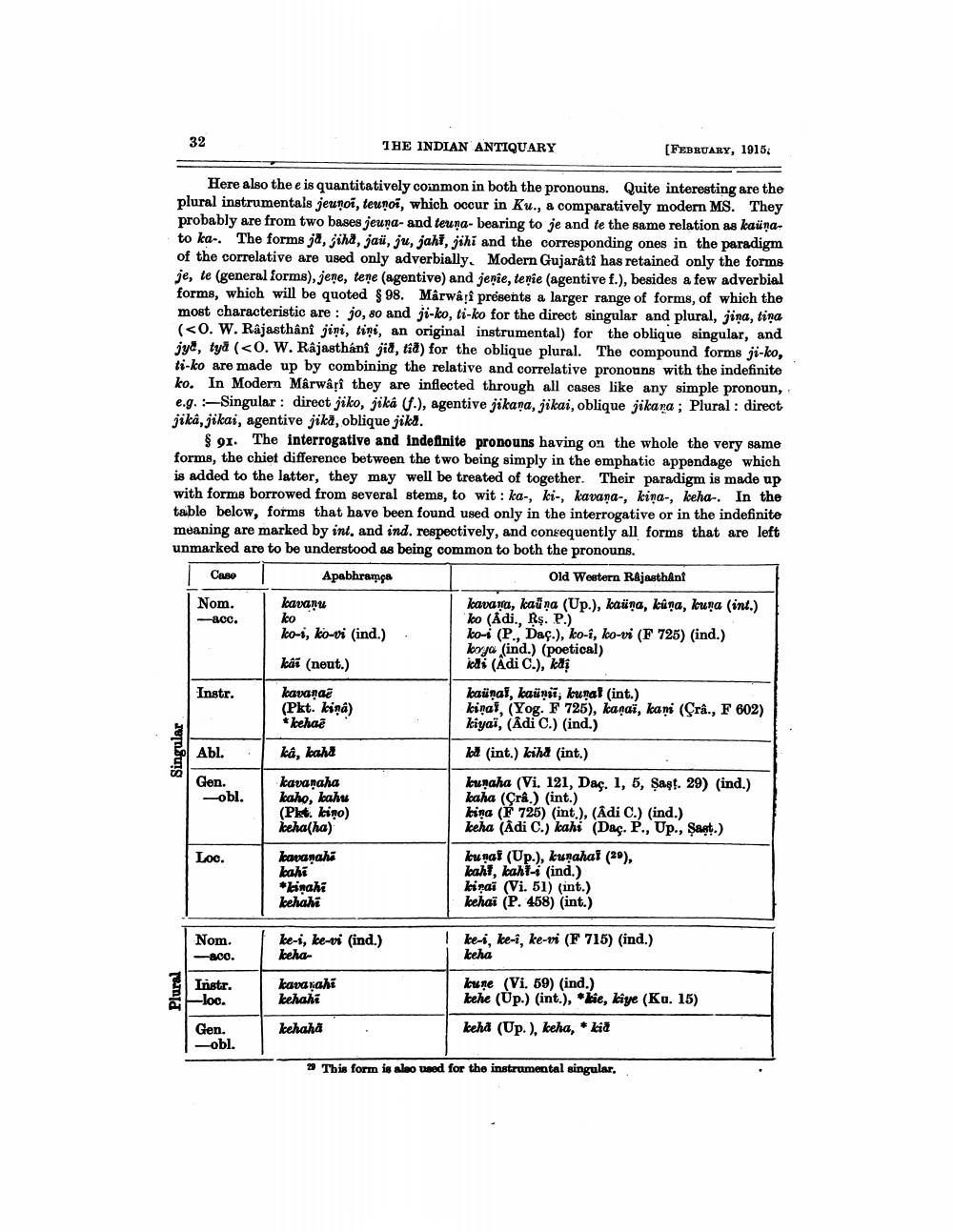________________
32
THE INDIAN ANTIQUARY
(FEBRUARY, 1915.
Here also the e is quantitatively coinmon in both the pronouns. Quite interesting are the plural instrumentals jeunoi, teunoi, which occur in Ku., a comparatively modern MS. They probably are from two bases jeuna- and teuna-bearing to je and te the same relation as kaunato ka-. The forms ja, jiha, ja, ju, jahi, jihi and the corresponding ones in the paradigm of the correlative are used only adverbially. Modern Gujarati has retained only the forms je, te (general forms), jene, tene (agentive) and jenie, tenie (agentive f.), besides a few adverbial forms, which will be quoted $ 98. Marwârî presents a larger range of forms, of which the most characteristic are: jo, 80 and ji-ko, ti-ko for the direct singular and plural, jiņa, tina (<0. W. Rajasthani jini, tini, an original instrumental) for the oblique singular, and jyd, tyd (<0. W. Rajasthani jia, tia) for the oblique plural. The compound forms ji-ko, ti-ko are made up by combining the relative and correlative pronouns with the indefinite ko. In Modern Marwari they are inflected through all cases like any simple pronoun, e.g. -Singular: direct jiko, jika 1.), agentive jikana, jikai, oblique jikara ; Plural: direct jika, jikai, agentive jikā, oblique jika.
$91. The interrogative and indefinite pronouns having on the whole the very same forms, the chiet difference between the two being simply in the emphatic appendage which is added to the latter, they may well be treated of together. Their paradigm is made up with forms borrowed from several stems, to wit : ka-, ki-, kavana-, kina-, keha-. In the table below, forms that have been found used only in the interrogative or in the indefinite meaning are marked by int, and ind. respectively, and consequently all forms that are left unmarked are to be understood as being common to both the pronouns. Case Apabhrama
Old Western Rajasthan Nom. kavanu
kavawa, kauna (Up.), kaüna, kûna, kuna (int.) acc.
ko (Adi., Rş. P.) ko-i, ko-vi (ind.)
ko-i (P., Daç.), ko-i, ko-vi (F 725) (ind.)
koja (ind.) (poetical) kai (neut.)
idi (Adi C.), kai Instr. kavanae
kaüņai, kaunii, kunat (int.) (Pkt. kina)
kiŋal, (Yog. F 725), kaņai, kani (Crâ., F 602) *kehae
kiyai, (Adi C.) (ind.) Abl. ka, kaha
(int.) kiht (int.) Glen. kavanaha
kunaha (Vi. 121, Dac. 1, 5, $art. 29) (ind.) -obl. kaho, lahu
kaha (Fra.) (int.) (PK. kino)
kina (F 725) (int.), (Adi C.) (ind.) keha(ha)
keha (Adi C.) kahi (Dac. P., Up., Şast.) Loc. leavanaha
lounaf (Up.), kunahai (2), kahi
kahi, kaht-i ind.) *Linahi
kinai (Vi. 51) (int.) kehahi
kehai (P. 458) (int.)
Ico
Singular
Nom. - 800.
ke-i, ke-vi (ind.) keha
! ke-2, ke-i, ke-vi (F 715) (ind.)
keha
Plural
Instr. -loc.
kavarahi kehahi
kune (Vi. 59) (ind.) kehe (Up.) (int.), sie, kiye (Ku. 15) keha (Up.), keha, * kia
kehaha
Gen. - obl.
%
This form is also used for the instrumental singular.




